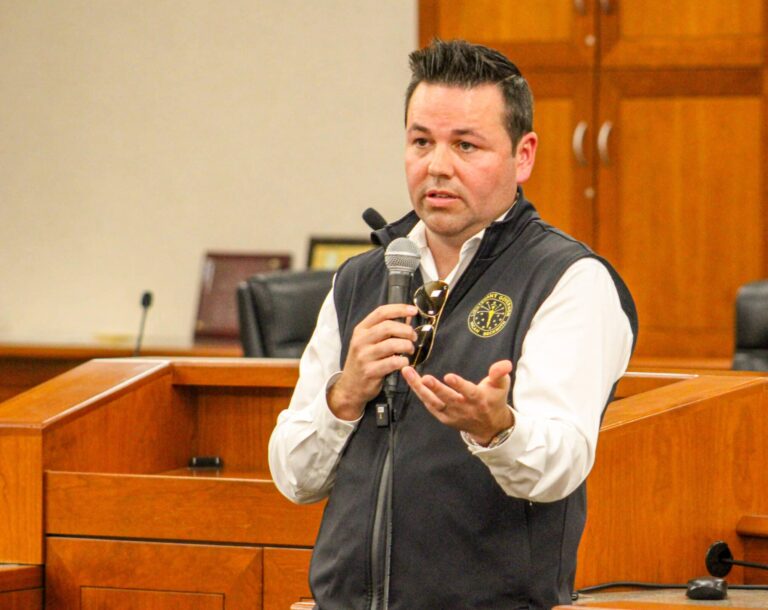
This story was originally published by Chalkbeat. Sign up for their newsletters at ckbe.at/newsletters
By Aleksandra Appleton
Chalkbeat
Sign up for Chalkbeat Indiana’s free daily newsletter to keep up with Indianapolis Public Schools, Marion County’s township districts, and statewide education news.
As six Indiana school districts seek local property tax referendums to pay for teachers and transportation, Lt. Gov. Micah Beckwith joined the campaign to defeat them by door-knocking in Avon.
Beckwith said Saturday in a social media post that he was out in Hendricks County ahead of the Nov. 4 election to encourage voters to defeat Avon Community Schools’ referendum renewal — an unusual move for a statewide official. The referendum funds 170 teacher and staff positions in the district, as well as student programming at Avon High School.
In an interview, Beckwith said it’s not just Avon’s referendum he’s against: All six referendums should be defeated in order to prevent property tax increases.
“Property taxes are crushing too many homeowners, and this referendum would only make it worse,” his post said. “Families deserve relief, not bigger bills. Seniors deserve security, not fear of being taxed out of their homes. And young families deserve a future where owning a home is achievable.”
But supporters of referendums say they’re a critical source of stable funding on top of existing property tax revenue and state and federal funding sources. Operations referendums support staff positions, transportation, and programming, while capital referendums fund construction projects and safety referendums pay for school safety initiatives.
“The Indiana Legislature enacted property tax caps 15 years ago and gave local communities the referendum process as a lifeline if they believe their schools need more funding to be effective,” Avon schools said in a statement. “This is a local issue for local citizens, so we’re confused as to why our Lieutenant Governor — who is not responsible for education policy and does not live in our community — would take an interest in this campaign.”
Property tax reform has been a key issue this year for Beckwith, Gov. Mike Braun, and other Republican leaders. New laws capped the growth in general operating revenue that districts expect to receive from property taxes, restricted referendums to general election years, and implemented requirements that districts share some of their tax revenue with charter schools. And Beckwith said the laws didn’t go far enough because they didn’t provide immediate relief to taxpayers.
An amendment allowed districts to run referendums in the November 2025 election — and made them high stakes for districts that will use the results to inform decisions about staffing through the next year.
Avon schools said in a statement that Beckwith did not contact the district about the referendum.
Beckwith said his office had been contacted by a local organizer opposed to the referendum. He said most voters he spoke to while door-knocking were opposed to the referendum.
“I don’t want to burden Hoosiers,” he said. “I want to give them a breather.”
In a statement, Avon schools said the district would “prefer the state provide sufficient funding to public schools,” but that until it did, school corporations would have to use referendums “to cover the funding gap.”
Avon’s referendum renewal is primarily aimed at retaining staff positions in order to keep class sizes down, Superintendent Scott Wyndham previously told Chalkbeat. It also supports clubs at Avon High.
The referendum renewal process is “a non-partisan, local campaign to support our students and educators in Avon Community School Corporation,” the statement said.
Its tax rate of 33 cents per $100 of assessed value is slightly lower than the original referendum passed in 2018, which was 35 cents. On the decrease, Beckwith said tax bills would likely increase anyway due to greater assessed values.
In 2011, a referendum put forth by the district failed, leading to larger class sizes, which had a negative impact on academics, Wyndham said.
Beckwith said he doesn’t want to see layoffs, but that districts sometimes use the threat of layoffs to pass referendums. He said existing property tax revenue and state dollars should be adequate to fund schools, and that defeating the referendums would require schools to operate more efficiently.
“I don’t think we have a money problem, I think we have a spending problem,” Beckwith said. “Schools have other funding they can use to keep teachers — they just don’t want to. They want to make sure money is still left to do big projects.”
The district statement said this year’s referendum has been endorsed by groups including the Washington Township Board, the Greater Avon Chamber of Commerce, the Avon Library Board, Avon Oriole Advocates, and the Avon Federation of Teachers.
“These local governing bodies and community entities have a huge stake in the health and vitality of our community and our schools,” the district statement said. “They are far better suited to speak on this local issue than a state-wide elected official who does not live or work here.”
Election day is Nov. 4, with referendums on the ballot for voters in six school districts. Find your polling location and more information here.
Aleksandra Appleton covers Indiana education policy and writes about K-12 schools across the state. Contact her at aappleton@chalkbeat.org.
Chalkbeat is a nonprofit news site covering educational change in public schools.